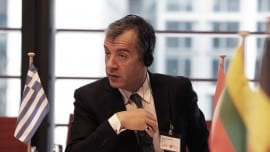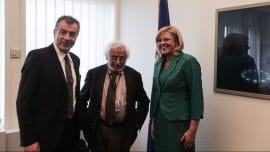“This is indeed the last effort. This is why, despite our many differences with SYRIZA and Alexis Tsipras, we decided to support him in his effort to seek help in Brussels. We support him to bring back a real deal and reach an honest compromise. The more he delays, the worse the conditions will be for us,” stated Stavros Theodorakis in his interview with the German Handelsblatt, while explaining clearly that "a return to the drachma would mean that we join the third world".
Asked how he and his political party would have negotiated if they had the opportunity, Mr. Theodorakis clarified: “I would have resolved a series of problems since February. The first steps to reform the retirement system could have been implemented back then: elimination of early retirements, cuts and a ceiling on high pensions. I would have implemented these reforms on my own, without waiting for the creditors to tell me, because there were for the good of my country. I would have taken measures against corruption in the public sector and I would have proceeded with cuts in expenditures, without the need for our foreign partners to ask for them. This is the major mistake of Greek politicians: they avoid making hard decisions”.
Read the interview below:
The Greek opposition politician, in an interview with Handelsblatt, comments on the outcome of the referendum, the failure of the political class in his country and the potential consequences of a Grexit.
The headquarters of the political party Potami are situated in a quiet street in Ampelokipoi, a neighborhood of Athens. The political party was established in early 2014 and received approximately 6% in the elections that took place at the end of January 2015. It is a small party with many plans. Stavros Theodorakis, 52 years old, wants to change radically the political culture of his country. Behind his desk, there is a bookcase with many books and souvenirs. On one wall hangs a large picture, , a black and white one, depicting women farmers in a field. On the other wall, are two TV screens. Theodorakis was in TV for many years. He seems worried and intense. Every now and then, he smiles faintly. The situation is serious.
Mr. Theodorakis, by the end of the week, Greece must submit to the European Union a new economic plan with reforms. Is this the last chance?
We have heard many times lately the sentence “last chance”. But I believe that this is indeed the last, the very last effort. This is why, despite our many differences with SYRIZA and Alexis Tsipras, we decided to support him in his effort to seek help in Brussels. This was made clear on Monday at the meeting of the political leaders, which was headed by the President of the Republic.
You were in favor of the YES in the referendum, while Mr. Tsipras and 61% of the voters said NO. How do you explain this outcome?
Demagogy and populism defeated us. The ones who said NO in the referendum believed the promises of Tsipras that he would bring back a deal with the creditors within 48 hours. The 48 hours have passed. They passed without an agreement. At the meeting of the political leaders, I told Mr. Tsipras: We could have also lied to the Greek people, but we did not do it. Many in Europe think that the NO in the referendum means NO to Europe. This is not the case. Many Greeks believed that Alexis Tsipras had cornered the Europeans, by holding this referendum. They thought that a NO to the referendum would bring a better result. This is what Mr. Tsipras made them believe. This was not just a lie. It was a serious political blunder, turning a whole nation into a blackmailer.
Stavros Theodorakis was born in the village of Drapania in Western Crete and grew up in a working class suburb in Attica. He is one of the most famous journalists in Greece. From the beginning of 1980, he worked in many newspapers and radio stations. From 2000 to 2014, he hosted the TV show “Protagonists”, a political talk show.
In February 2014, Theodorakis quit journalism and established, along with fellow thinkers, the centre-left political party To Potami. He claims that Potami is neither right, nor left. He says that his political party is a Pro-European, progressive and modern party.
In the elections that took place in January 2015, Potami became the fourth power in the Parliament, with 17 MPs.
Mr. Tsipras did not only win the referendum with a loud and clear NO, but is also the only Greek Prime Minister that enters negotiations with the creditors with the support of all three opposition parties. Don’t you think that this makes him a unique protagonist in the political landscape?
When your house is burning, you have no alternatives. For a long time, we have been urging Mr. Tsipras to assume his political responsibilities. Our support is crystal clear. We support him for the purpose of bringing back a real agreement, to reach a sincere compromise.
Does he want that?
I think he has no other choice anymore.
A major part of his political party wants a clash with Europe. They want Greece to leave the Eurozone and the European Union. They want a different political system. What does Mr. Tsipras want?
Mr. Tsipras is flirting with everyone. He is flirting with the ones who want the euro and the ones who wish a return to drachma. He is flirting with the ones that want Europe, and the ones who are on the side of Russia and who wish Greece to become another Venezuela. I told him many times: The great political leaders must take major decisions. We cannot keep everyone happy.
If Mr. Tsipras really wanted to conclude a deal, wouldn’t he have done it already?
Of course. And this would have been a much better solution. The more he delays, the worse the conditions will be for us.
What would a Grexit mean?
A return to drachma would mean that we join the third world.
What would you have done differently in the negotiations?
I would have resolved a series of problems since February. Reforms in the retirement system could have been implemented back then: elimination of early retirements, cuts and a ceiling on high pensions. I would have implemented these reforms on my own. I would not have waited for the creditors to ask me, because this is for the good of my country. I would have taken measures against corruption in the public sector and I would have proceeded with cuts in expenditures, without the need for our foreign partners to ask for them. This is the major mistake of Greek politicians: they avoid making hard decisions”.
Does Greece need a debt restructuring?
All countries have debts.. The question is whether a country can support the level of its debt, taking into consideration the size of its economy. By this measurement, our debt is enormous. Therefore, I believe that we need some form of debt restructuring, for example a longer grace period and lower interest rates. We must extend the repayment period in order to lower the annual repayment installments of our debt.
What must be done, so that the Greek banks reopen?
The banks should have never closed, and they would not have closed if the Government had reached a solution, while the country was still under the umbrella of the Program. History will assign serious blame on those that let the Program expire, before a new deal was reached. Mr. Tsipras claims that the creditors forced the shutdown of the banks to blackmail us. Some Greeks will always blame the foreigners what is happening to them. In this way, for hundreds of years, Greeks have been avoiding assuming responsibility. This is also the approach adopted by the politicians that are not doing their job correctly. Even in this crisis, from the start, the governments blamed the foreigners for everything.
Were the creditors fair to Greece?
Europe made mistakes, out of ignorance and prejudice against Greece. But, the biggest mistakes of the past years were made by the Greek politicians. They convinced the people that the foreigners were responsible for the dire situation we were in. They never presented them as partners, with whom we worked together.
Why did the bail-out programs in Spain, Portugal, Ireland and Cyprus work? And why not in Greece?
Because the crisis found us at a time when we had a very bad political leadership. People are not that different, one from another. The problem is the politicians.
Politicians are elected by people!
That’s right. But, there is a specific problem in Greece. The entanglement of politics with the media and the wealthy. This power triangle served its own interests, not the interests of the country. The politicians’ populism was only possible because of the tie with the populism of the media, and in the background are the powerful financial interests.
This is why the program failed in Greece?
Because of this power triangle that did not allow the implementation of reforms, or to fight corruption. In all austerity programs, there were windows to allow the escape of the nomenklatura and of "our kids". This client system endured. The bill was paid by normal people with cuts in the social services, with unemployment and tax increases. The waste was not reduced, and there were no radical structural changes.
You are describing the lack of political culture in your country. Can you tell us where Potami, your political party, stands?
Potami is a movement of citizens, which was created outside the old political system. We keep our distance from demagogy and populism and we try to graft new ideas into the political dialogue. Sometimes, this is very hard. But sometimes, it is easy.
You are trying to do something that is against the political tradition that you are describing. Could this work?
This is the great challenge for us. This is a personal challenge for each one of us in Potami. We are not professional politicians. We all used to be successful professionals, each one in his own field. We entered politics because we could not stand anymore to be governed by failed politicians. With some rare exceptions, political decisions in this country are made by people who have fail, people who emerge from the party apparatus, or who are descendants of political dynasties, or union leaders that become politicians.
Do you believe that Potami can become a majority political party? You claim, yourself, that populism won in the referendum.
The outcome of the referendum was a heavy defeat for me. However, I hope that, in a while, people will realize that our policies would have led the country out of the crisis sooner. The truth is often uncomfortable, hard for Greece. Our political culture is still influenced by the East: Big words, nice expressions, with no practical meaning.
10 July 2015







